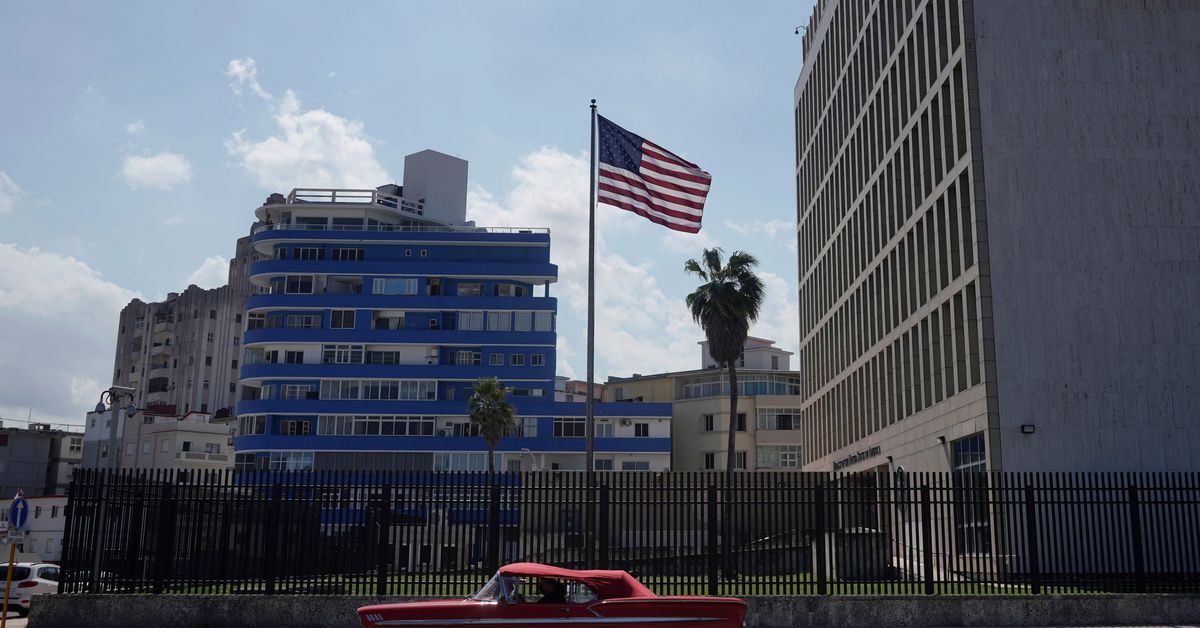U.S. appears set to deem Cuba not cooperating fully against terrorism-document

A vintage car used for touristic city tours passes by the U.S. Embassy in Havana, Cuba, November 10, 2021. Photo taken on November 10, 2021. REUTERS/Alexandre Meneghini
WASHINGTON, May 19 (Reuters) – The Biden administration on Thursday appeared set to renew its assessment that Cuba is among a handful of countries “not cooperating fully” with the United States in the fight against terrorism, according to a government document.
Formal publication of the decision was scheduled for Friday, but Cuban Foreign Minister Bruno Rodriguez, apparently responding to a draft notice in the Federal Register signed by Secretary of State Antony Blinken, condemned it as “one more lie” coming from Washington.
This follows the Biden administration’s announcement on Monday of a partial rollback of Trump-era restrictions on remittances and travel to the Communist-ruled island, moves that Havana has said do not go far enough. read more
Register now for FREE unlimited access to Reuters.com Register
Tensions have risen over signals that Cuba – along with Nicaragua and Venezuelan President Nicolas Maduro’s government – could be excluded from the U.S.-hosted Summit of the Americas next month. A potential boycott by a growing number of leaders, including Mexican President Andres Manuel Lopez Obrador, has raised the risk of embarrassment for President Joe Biden. read more
“I hereby determine and certify to the Congress that the following countries are not cooperating fully with United States antiterrorism efforts,” Blinken wrote, listing Cuba along with Iran, North Korea, Syria and Venezuela.
The May 11-dated notice was labeled a “public inspection document,” making it available for public comment.
A State Department spokesperson did not respond to Reuters’ question whether it would be amended or issued on Friday as written.
Asked to explain the U.S. decision on Cuba, the spokesperson said “we undertake a review of a country’s overall level of cooperation in our efforts to fight terrorism, taking into account our counterterrorism objectives with that country and a realistic assessment of its capabilities.”
The draft assessment is almost identical to the one issued by the Biden administration a year ago, which stuck with the Trump administration’s determination.
“The United States again maintains the slander of saying that Cuba doesn’t cooperate sufficiently in the fight against terrorism,” Rodriguez said on Twitter, calling it a “pretext to continue an unceasing economic war universally repudiated.”
Possibly hindering U.S.-Cuban engagement has been a diplomatic chill that has mostly continued since Biden took over in January 2020 from Donald Trump, who reversed much of former President Barack Obama’s historic rapprochement with Havana. Biden, who served as Obama’s vice president, responded with sanctions over Havana’s crackdown on street protests last July.
Trump designated Cuba a state sponsor of terrorism just before leaving office. Critics called that decision unjustified and aimed at complicating Biden’s approach to Cuba. His administration has said the designation is under review.
The State spokesperson said assessment of insufficient cooperation was made under a separate statute from the terrorism-sponsor designation.
Register now for FREE unlimited access to Reuters.com Register
Reporting By Matt Spetalnick; additional reporting by David Sherwood in Havana; Editing by Stephen Coates
Our Standards: The Thomson Reuters Trust Principles.






